LITIGATION TOURISM
 In 2023, the United States Supreme Court and the Pennsylvania Supreme Court eliminated important constitutional and statutory jurisdictional barriers that protected defendants from being dragged into plaintiff-friendly courts with no direct ties to the events or parties involved in a claim. Without these protections in place, plaintiffs’ lawyers can file lawsuits in the state court of their choosing, taking advantage of a court’s reputation for high verdicts and plaintiff-friendly rulings.
In 2023, the United States Supreme Court and the Pennsylvania Supreme Court eliminated important constitutional and statutory jurisdictional barriers that protected defendants from being dragged into plaintiff-friendly courts with no direct ties to the events or parties involved in a claim. Without these protections in place, plaintiffs’ lawyers can file lawsuits in the state court of their choosing, taking advantage of a court’s reputation for high verdicts and plaintiff-friendly rulings.
Through its decision in Mallory v. Norfolk Southern, the United States Supreme Court opened up Pennsylvania state courts to additional cases involving out-of-state parties and the Pennsylvania Supreme Court adopted a broad application of the state’s venue rule, which then will allow a majority of these cases to be filed in plaintiff-friendly county courts like the Philadelphia Court of Common Pleas.
SCOTUS Greenlights Litigation Tourism in Philadelphia
On June 27, 2023, a fragmented U.S. Supreme Court handed down the Mallory decision – a plurality opinion that broadens the opportunity for attorneys to pursue lawsuits in Philadelphia that have no connection with the events or involved parties.
In Mallory v. Norfolk Southern Railway, a Virginia resident sued a Virginia-based railroad in Pennsylvania, relying purely on the railroad’s registration to do business in the state. A state statute, 42 Pa. C.S.A. § 5301, provides that by registering to do business in Pennsylvania, a company consents to general jurisdiction in the state’s courts.
Given a series of U.S. Supreme Court decisions limiting the ability of state courts to assert jurisdiction over defendants in disputes that lack a connection to the forum state, the Pennsylvania Supreme Court ruled that the statutory scheme “does not constitute voluntary consent to general jurisdiction but, rather, compelled submission to general jurisdiction by legislative command,” and is unconstitutional under the due process clause. In those cases, the U.S. Supreme Court had limited general jurisdiction, which does not require a link between the claim and the forum state, to situations in which a business was “at home” in the state, meaning it was incorporated or had its principal place of business there.
The U.S. Supreme Court, to the surprise of many, reversed. It found that constitutional due process concerns are not implicated “when an out-of-state defendant submits to suit in the forum State” as the Pennsylvania business registration statutes require. By virtue of registering to do business in the state, because of the statute, a business consented to be sued for any purpose in its courts.
The Philadelphia Court of Common Pleas has a long-standing reputation for allowing out-of-state plaintiffs to flood court dockets with relatively low barriers of entry and this decision will further embolden the court. This policy benefits plaintiffs but negatively impacts Pennsylvanians. It clogs courts, drains court resources, and drives businesses out of the state leading to job loss.
Pennsylvania Supreme Court Adopts Broad Application of State Venue Rule
In late November, the Pennsylvania Supreme Court issued its long-awaited opinion in Hangey v. Husqvarna Professional Products. The disappointing decision already has been termed “one of if not the most impactful venue decisions in the last 20 years” by the plaintiffs’ bar, as it opens up plaintiff-friendly courts, like the Philadelphia Court of Common Pleas, to even more cases that lack a direct connection to the venue.
A plaintiffs’ attorney filed that lawsuit, stemming from a lawn mower accident, in Philadelphia even though the plaintiff purchased the equipment in Bucks County and was injured in Wayne County. The manufacturer was not registered to do business in Philadelphia, had no warehouses or other facilities, no address or telephone numbers, no property, and no employees or officers there. Just 0.005% of the manufacturer’s sales took place in Philadelphia. The manufacturer argued that the case should be transferred to Wayne County, where the accident occurred, or to Bucks and Montgomery Counties. In response, the trial court had transferred venue to Bucks County, where the plaintiff had purchased the allegedly defective lawnmower, based on this de minimis percentage, but a mid-level appellate court reversed.
The Pennsylvania Supreme Court found that the case could be decided in Philadelphia County. It held that Pennsylvania’s venue provision- which states that an action may be brought in a county where a corporation “regularly conducts business”- applies even when a defendant only has established a mere presence. The Court’s opinion dealt with its longstanding “quality-quantity” test under the statute, concluding that the trial court’s reliance on the percentage of the defendant’s total business in Philadelphia County was improper.
The Court explained that percentage of revenue is just one “data point” in a broader assessment of how “regular” a defendant’s business activities are in a forum. In doing so, the Court did not mention percentage of revenue at all; it noted only that the defendant’s sales to its two authorized dealers in the county had been “consistent” and were “not interrupted” during the relevant time period. The Court held that so long as “a company maintains a constant physical presence in the forum county” to perform acts in furtherance of its business objectives—even if only through an authorized dealer—venue will be appropriate in that county.
By expanding the application of the state’s venue rule, the Court will only further the forum-shopping problem already plaguing the Pennsylvania judicial system. It has eliminated an important safeguard for defendants and further tilts the scales in favor of plaintiffs who can choose to sue in the county that they view as most likely to return a favorable verdict and large award, rather than the county connected to the lawsuit.
Medical Liability Explodes in Philadelphia Thanks to State High Court Decision
In August 2022, the Supreme Court of Pennsylvania unilaterally eliminated constraints that have prevented lawyers from picking the most plaintiff-friendly jurisdiction for filing medical liability actions. At issue was a 2002 court rule that required plaintiffs’ lawyers to file medical liability lawsuits in the county where treatment occurred, not where a jury is expected to view the claim most favorably or return the largest award. The purpose was to reduce forum shopping and create a more fair and balanced playing field. Excessive medical liability drives up doctors’ insurance expenses, increases costs for patients, and reduces the public’s access to healthcare.
In light of the newly eliminated rule, attorneys can sue for medical malpractice not only where medical treatment took place, but also any additional location where the healthcare provider operates an office, any additional hospital locations in which the physician provides care, or where a physician lives. Of course, the state’s personal injury bar, through the Pennsylvania Association for Justice, supported the change.
Plaintiffs will now flock to areas like Philadelphia, where juries are more willing to award higher verdicts in favor of plaintiffs.
As expected, new medical liability filings are surging in Philadelphia. Through October 2023, there was a 108% increase in filings (468) when compared to the same time last year (225). From 2017 to 2019, plaintiffs suing healthcare providers in Philadelphia County won at a 36% rate, compared to a 12% and 9% rate in nearby Montgomery and Lancaster counties, respectively. As a result of the elimination of the rule, cases filed against health systems in a variety of different counties across the state have now been refiled in Philadelphia.
In May 2023, the Pennsylvania Coalition for Civil Justice Reform (PCCJR) sent the Pennsylvania Supreme Court a formal request to immediately review the rule change. The letter points out how every month of 2023 has shown a significant increase in filings in Philadelphia over the previous six years for the same month. Philadelphia courts are struggling to keep up with the increased case load and if the current filing rate continues, the trial calendars for 2025, 2026, and 2027 will be filled – by the end of 2023.
Medical malpractice insurance rates have predictably increased since the rule change went into effect. According to PCCJR’s letter, “manual rates have been increased by specialty, with a minimum increase of 10.5% and a maximum increase of 16.1%.”
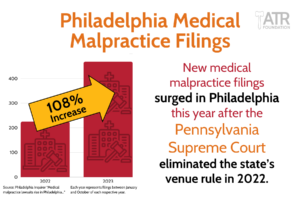
 The Philadelphia Court of Common Pleas and the Supreme Court of Pennsylvania joined Georgia as the nation’s top Judicial Hellholes®.
The Philadelphia Court of Common Pleas and the Supreme Court of Pennsylvania joined Georgia as the nation’s top Judicial Hellholes®.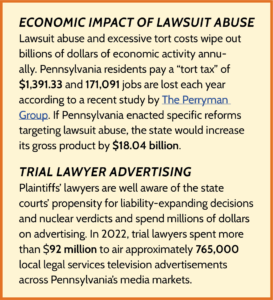 the Philadelphia court continues to issue nuclear verdicts at a staggering rate. An eye-popping almost $1 billion award was levied against Mitsubishi in a product liability case in 2023. The Philadelphia Court of Common Pleas also continues to be a hotbed for out-of-state plaintiffs’ mass torts claims. Plaintiffs’ lawyers also are looking to expand premises liability for business owners in the city. Additionally, the Pennsylvania Supreme Court issued a problematic decision on punitive damages, which will only lead to more abuses and more massive verdicts.
the Philadelphia court continues to issue nuclear verdicts at a staggering rate. An eye-popping almost $1 billion award was levied against Mitsubishi in a product liability case in 2023. The Philadelphia Court of Common Pleas also continues to be a hotbed for out-of-state plaintiffs’ mass torts claims. Plaintiffs’ lawyers also are looking to expand premises liability for business owners in the city. Additionally, the Pennsylvania Supreme Court issued a problematic decision on punitive damages, which will only lead to more abuses and more massive verdicts.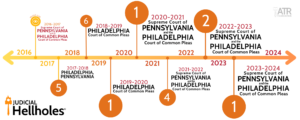



 In 2023, the United States Supreme Court and the Pennsylvania Supreme Court eliminated important constitutional and statutory jurisdictional barriers that protected defendants from being dragged into plaintiff-friendly courts with no direct ties to the events or parties involved in a claim. Without these protections in place, plaintiffs’ lawyers can file lawsuits in the state court of their choosing, taking advantage of a court’s reputation for high verdicts and plaintiff-friendly rulings.
In 2023, the United States Supreme Court and the Pennsylvania Supreme Court eliminated important constitutional and statutory jurisdictional barriers that protected defendants from being dragged into plaintiff-friendly courts with no direct ties to the events or parties involved in a claim. Without these protections in place, plaintiffs’ lawyers can file lawsuits in the state court of their choosing, taking advantage of a court’s reputation for high verdicts and plaintiff-friendly rulings.
 Philadelphia’s reputation as a pro-plaintiff jurisdiction with a propensity for nuclear verdicts is a main reason it’s a hotspot for medical liability cases and mass tort litigation.
Philadelphia’s reputation as a pro-plaintiff jurisdiction with a propensity for nuclear verdicts is a main reason it’s a hotspot for medical liability cases and mass tort litigation. the Philadelphia Complex Litigation Center. Plaintiffs across the country have filed suits alleging that paraquat, a main chemical in one of the most commonly used commercial herbicides, was responsible for the development of their Parkinson’s disease. After months of disputes between the parties regarding how the proceedings should be consolidated, in March of this year, the court approved
the Philadelphia Complex Litigation Center. Plaintiffs across the country have filed suits alleging that paraquat, a main chemical in one of the most commonly used commercial herbicides, was responsible for the development of their Parkinson’s disease. After months of disputes between the parties regarding how the proceedings should be consolidated, in March of this year, the court approved 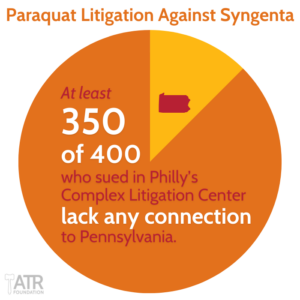 Syngenta
Syngenta  exposed the flaws behind the science of Valisure’s claims, which, as she pointed out in her
exposed the flaws behind the science of Valisure’s claims, which, as she pointed out in her  Despite national asbestos claims falling 7% nationwide from last year, the Philadelphia Court of Common Pleas saw a
Despite national asbestos claims falling 7% nationwide from last year, the Philadelphia Court of Common Pleas saw a  In May 2023, the Supreme Court of Pennsylvania increased liability for contractors that unknowingly create potentially dangerous conditions on job sites even when they no longer have access to the property.
In May 2023, the Supreme Court of Pennsylvania increased liability for contractors that unknowingly create potentially dangerous conditions on job sites even when they no longer have access to the property. On July 13, 2021, Matthew Maguire was fatally stabbed in the parking lot of a McDonald’s in Philadelphia County. In July 2023, Huy Nguyen, the administrator of Maguire’s estate, claimed that McDonald’s knew or should have known about the risk of violence to their customers and failed to provide adequate security.
On July 13, 2021, Matthew Maguire was fatally stabbed in the parking lot of a McDonald’s in Philadelphia County. In July 2023, Huy Nguyen, the administrator of Maguire’s estate, claimed that McDonald’s knew or should have known about the risk of violence to their customers and failed to provide adequate security.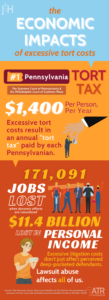 In July, the full Pennsylvania Superior Court
In July, the full Pennsylvania Superior Court 

